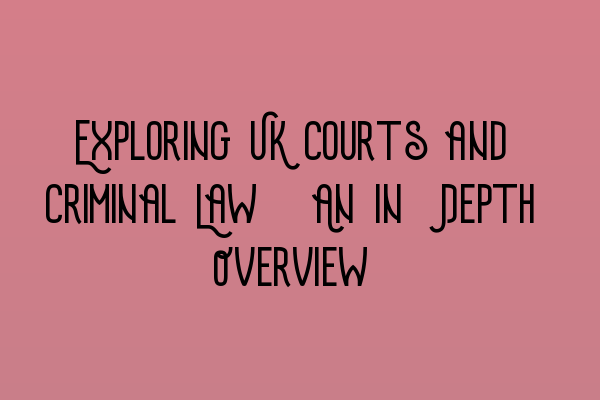Exploring UK Courts and Criminal Law: An In-Depth Overview
Welcome to SQE Criminal Law & Practice, the leading authority on criminal law in the UK. In this blog post, we will take you on a comprehensive journey through the UK courts and criminal law system. Whether you are a law student, a legal professional, or simply someone curious about how the criminal justice system works, this article will provide you with the essential knowledge you need.
The UK Courts System
The UK courts system is a vital component of the criminal justice system. It ensures that justice is served by impartially addressing cases and resolving disputes. Let’s delve into the different levels of courts in the UK:
- Magistrates’ Courts: Magistrates’ courts are the first point of entry into the criminal justice system. They handle less serious criminal offenses, known as summary offenses. The magistrates, also known as justices of the peace, act as judges and make decisions on guilt or innocence and impose appropriate sentences.
- Crown Courts: Crown courts deal with the more serious criminal offenses, which are known as indictable offenses. These offenses are usually referred to the Crown Court after a preliminary hearing in the magistrates’ court. The Crown Court consists of a judge and a twelve-member jury who decide on the guilt or innocence of the accused.
- High Court: The High Court is a superior court of record and has both civil and criminal jurisdictions. In criminal matters, the High Court handles appeals from the Crown Court and reviews points of law of public importance. The High Court is also responsible for conducting trials of serious crimes, such as murder or terrorism.
- Supreme Court: The Supreme Court is the highest court in the UK, and its decisions are binding on all lower courts. It serves as the final court of appeal, both in civil and criminal cases. The Supreme Court is primarily responsible for determining points of law and ensuring consistency in the interpretation and application of the law.
Now that we have explored the different levels of courts, let’s move on to understanding the basics of criminal law in the UK.
The Basics of Criminal Law in the UK
Criminal law, also known as penal law, refers to the body of law that deals with crimes committed against society. It sets out the offenses and their corresponding penalties. Here are some key concepts to understand:
- Crimes: Crimes are specific acts or omissions that are considered harmful or dangerous to society. They range from minor offenses, such as theft or assault, to more serious crimes, such as murder or fraud.
- Elements of a Crime: For a person to be found guilty of a crime, certain elements must be proven beyond a reasonable doubt. These elements typically include a wrongful act (actus reus) and a guilty mind (mens rea).
- Defenses: Defendants in criminal cases have the opportunity to present various defenses to challenge their guilt. These defenses can include self-defense, duress, or insanity.
- Sentencing: Once an individual is found guilty of a crime, the court imposes a sentence. The sentence can range from a fine or community service to imprisonment or even life imprisonment, depending on the severity of the offense.
For a more detailed understanding of criminal law concepts, you may find our related articles helpful:
- Unveiling Duress and Undue Influence in Contracts
- Essentials of Consideration: Understanding the Backbone of Contracts
- Express and Implied Terms in Contracts: Decoding Agreement Components
- Mistake in Contract Law: Unraveling the Impact on Agreement Validity
- Strategies to Study Contract Law Effectively: Maximizing Your Learning Potential
Conclusion
Understanding the UK courts system and criminal law is crucial for anyone involved in or interested in the legal field. Whether you are a law student preparing for your SQE exams or a legal professional seeking to expand your knowledge, this in-depth overview has provided you with a solid foundation.
If you would like to delve deeper into the intricacies of criminal law and its application in specific cases, feel free to explore our website and access our extensive library of resources.
Remember, knowledge is power in the legal profession, and staying up-to-date with the latest developments and understanding the fundamental principles will set you apart.
